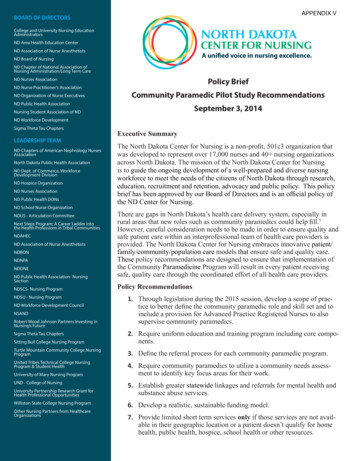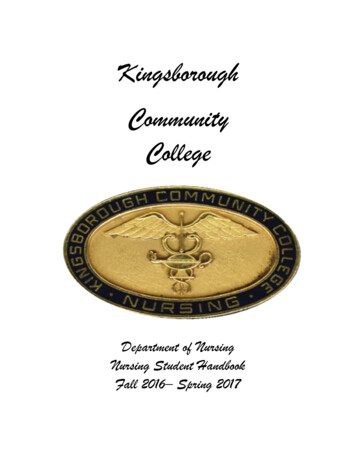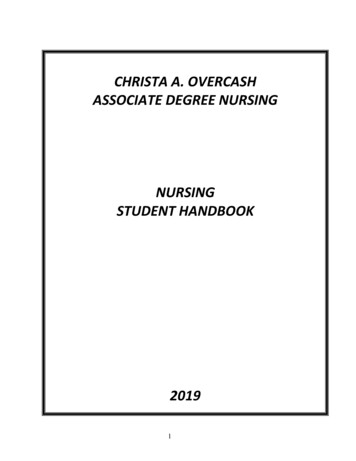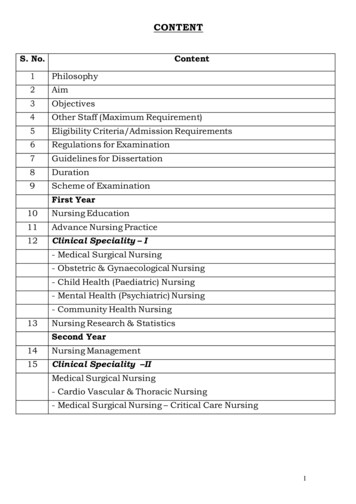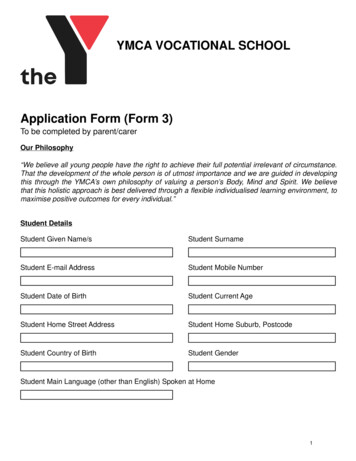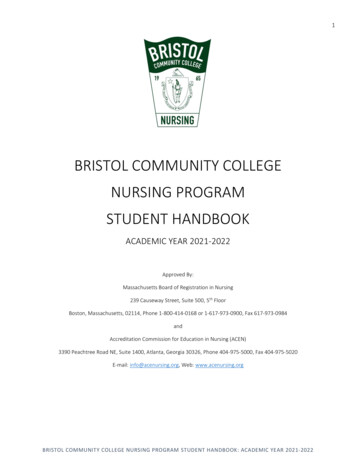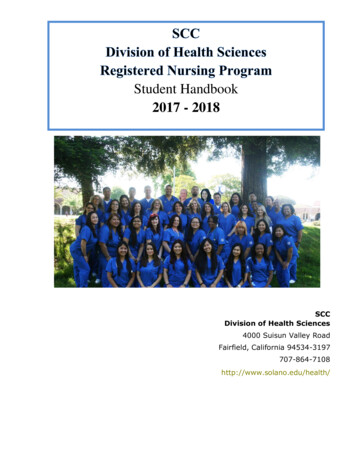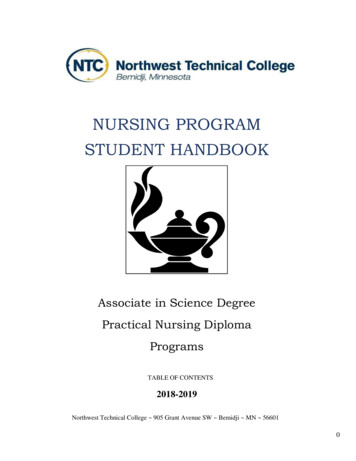
Transcription
NURSING PROGRAMSTUDENT HANDBOOKAssociate in Science DegreePractical Nursing DiplomaProgramsTABLE OF CONTENTS2018-2019Northwest Technical College 905 Grant Avenue SW Bemidji MN 566010
HANDBOOK DISCLAIMER . 2EQUAL OPPORTUNITY AND ACCESSIBILITY . 3HISTORY OF THE BEMIDJI NURSING PROGRAMS . 4CONTROLLING BODY . 5MISSION STATEMENT FOR NTC . 6PROGRAM APPROVAL, ARTICULATION AND ACCREDITATION . 6CORE VALUES (PHILOSOPHY) . 7NLN EDUCATIONAL COMPETENCIES MODEL . 8ROLE OF THE NURSE . 8NTC NURSING FACULTY COMMITTEES . 9NTC PROGRAM FRAMEWORK . 9NTC STUDENT LEARNER OUTCOMES . 10ASSOCIATE IN SCIENCE IN NURSING (AD) STUDENT LEARNER OUTCOMES: . 11PROGRAM POLICIES . 11COURSE/SEMESTER PROGRESSION . 20PROGRAM EVALUATION: . 21ACADEMIC EVALUATION OF NURSING COURSES . 21HEALTH EDUCATION SYSTEMS, INCORPORATED (HESI) ALSO REFERENCE AS ELSEVIER AND EVOLVE . 27LICENSURE INFORMATION . 32REGISTRATION STEPS: . 32PROGRAM DEFINITIONS . 33STUDENT SUCCESS FACTORS INCLUDING STUDYING HINTS . 36COMPLIO: CLINICAL/PROGRAM ELIGIBILITY TRACKING . 38TECHNICAL STANDARDS FOR ENTRY-LEVEL NURSING PROGRAMS . 39SOLUTION AND APPEALS PROCESSES . 43PROGRAM SEQUENCE . 441
INTRODUCTIONWelcome to Northwest Technical College (NTC) and the Nursing major. Nursing is a career rich in satisfaction,opportunities, and challenges. This handbook is intended to provide student information related to program policies andprocesses. Nursing faculty/advisors and course syllabi also serve as a source of program information. College policies canbe located in the online College Handbook and College Catalog (www.ntcmn.edu), and Student Services personnel.The faculty and administration of the Associate of Science Nursing Degree (AD) and Practical Nursing (PN) Diplomaprograms at Northwest Technical College (NTC) have prepared the Nursing Program Student Handbook for student andfaculty use. It addresses the general information, policies, and standards necessary to maintain an effective and efficientnursing education program. Students are held responsible for being informed of all nursing policies.HANDBOOK DISCLAIMEREvery effort is made to ensure the accuracy of the material contained in this Handbook. All policies, procedures, clinicalinformation/ documentation, program information, and fees are subject to changes at any time by appropriate action of thefollowing parties: nursing faculty, college administration, Director of Nursing and Health Sciences, (DON), MinnesotaState Colleges and Universities (Minnesota State System and System Board of Trustees, Minnesota Board of Nursing,and/or Minnesota Legislature without prior notification.This handbook is neither a contract nor an offer to make a contract. While every effort is made to ensure the accuracy of theinformation enclosed, the Handbook is updated as necessary. NTC reserves the right to make changes at any timeconcerning course offerings, degree requirements, services, policies, or any other subject addressed in this document. Theinformation enclosed is provided solely for the convenience of the students and readers.This handbook supersedes all previous versions of the Handbook. Students are accountable for familiarizing themselveswith its contents and for compliance with the policies and procedures contained within. Changes made between years arenoted in the handbook with the month and year of change or addition. (Added 8/2018)When a change is adopted into the handbook during an academic year, students will be emailed the change. (Clarified8/2018) Faculty may also include the change in the syllabi and/or highlight the change in D2L BRIGHTSPACE. This isconsistent with NTC Nursing’s goal of improved communication and follow-through.The listing of general NTC policies may be found using the following link: STUDENT student-life/handbook-policies/ (Added 7/ 2018)Graduation does not guarantee successful passing of NCLEX-RN or licensure by the Board of Nursing.Updates to the 2018-2019 Nursing Program Student Handbook were the combined efforts of the entire Nursing Department.Completion date: August 25, 20182
EQUAL OPPORTUNITY AND ACCESSIBILITYNTC is committed to a policy of nondiscrimination in employment and education opportunity. No person shall bediscriminated against in the terms and conditions of employment, personnel practices, or access to and participation inprograms, services, and activities with regard to race, sex, color, creed, religion, age, national origin, disability, maritalstatus, status with regard to public assistance, sexual orientation, or membership or activity in a local commission as definedby law. Inquiries regarding compliance, rights and other information may be addressed to the Equal Opportunity &Affirmative Action: (218) 755-4121.BSU/NTC is committed to making all educational programs, course materials, services and activities sponsored by theCollege accessible to individuals with disabilities. Students requesting accommodations due to a disability or other need foraccess should contact Accessibility Services as soon as possible. Accessibility Services is located in Decker Hall 202 atBSU and Room 203 at NTC. PH: 218.755.3883 (BSU), or 218.333.6656 (NTC) or email: accessibility@bemidjistate.edu.This information is also available through Minnesota Relay Services at 800.627.3529.3
History of the Bemidji Nursing ProgramsThe Northwest Technical College (NTC) Bemidji Campus Practical Nursing Program began in 1966 under the direction andthrough the efforts of Mr. Jake Outwin and Mrs. Sarah Robinson in addition to other community leaders. The first classenrolled 16 students, and through the years clinical sites ranged from Bemidji to Minneapolis. The Bemidji Campus wasinitially called the Bemidji Area Vocational Technical Institute and has undergone some name changes as the campusevolved. Effective July 1, 1992, Bemidji Technical College merged with five other northern Minnesota vocational ortechnical colleges to become Northwest Technical College, or “the Six Pack” as it became known. Campuses includedThief River Falls, East Grand Forks, Detroit Lakes, Moorhead, Wadena, and Bemidji. In July of 1995, NTC formallywithdrew from the six pack to become its entity, retaining the name of Northwest Technical College (NTC). In that sameyear, NTC became part of a new Minnesota State Education System, the Minnesota State Colleges and Universities(MnSCU), now called Minnesota State.Many changes in the nursing curriculum, along with the utilization of community agencies, have been made through theyears to accommodate the changing needs of students and the healthcare delivery system. In 1979, the Practical NursingProgram began implementing the present education articulation process through Agassiz Regional Nursing EducationConsortium (ARNEC), and in 1998, the program began offering an Associate of Applied Science in Practical Nursing(AASPN) in addition to the concurrently offered diploma in Practical Nursing. In the fall of 2000, this program became partof the single NTC Practical Nursing (PN) Program. The advent of the present Practical Nursing Diploma curriculum cameabout in 2014. This streamlined the program so students can earn their diploma and apply for LPN licensure in one year’stime. The two Practical Nursing programs became one program with the Minnesota Board of Nursing on Jan. 1, 2014.Between 2007 and 2014, the Northwest Technical College nursing program had an Associate of Science in Nursing degree.This option created an opportunity for Licensed Practical Nursing (LPN) graduates to obtain their associate’s degree. In thefall of 2013, a new two-year Generic Associate Degree program was launched. The first cohort of LPN to Associate Degree(LPN to RN Track) began in the summer of 2014. The Associate Degree (AD) in the nursing program has both campus anddistance options whereas the Practical Nursing (PN) program has only a face-to-face option.Since June 2017, both the AD and PN Nursing Programs at NTC have been in candidacy by the Accreditation Commissionfor Education in Nursing (ACEN). In August of 2018, NTC received notice of their ACEN Site Visit: March 6-8, 2019.4
CONTROLLING BODYNTC is aligned with Bemidji State University under the controlling body of Minnesota State System.NTC is the official controlling body of the Nursing Program.ORGANIZATIONAL CHART for NORTHWEST TECHNICAL COLLEGENursing DivisionPresident of Bemidji State University and NTCDr. Faith Hensrud, Ed.D.Vice President of Academic Affairs for NTCMr. Darrin Strosahl, MSDirector of Nursing and Health ScienceMichele D. Brielmaier, MSN, RNNursing Faculty – Full-TimeAshley Anderson, Julie Beevor, Karen Bierman, Ruth Eckstrom,Brenda Henriksen, Sandy Johanning (sabbatical)Nursing Faculty – Part-TimeLaurie Barnes, Nicole Larson, Emily Piller, Loretta VobrNursing Assistant FacultyCarrie Goodwin, Julie MillerNursing Program TechnicianSandy Thole
MISSION STATEMENT for NTCNorthwest Technical College integrates the value of work with the educational experience to developresourceful lifelong learners with knowledge, skills, and attitudes to secure rewarding careers and satisfyinglives in an increasingly technologically focused, globally interdependent, multicultural society. (Added7/2018)MISSION STATEMENT for NTC NURSING PROGRAMSThe mission of the Nursing Program is to educate diverse students to become quality entry-level healthcareteam members who provide compassionate, culturally sensitive, holistic care in a variety of settings. Duringthis process, students undergo a transformation where a spirit of inquiry, collaboration, resourcefulness, andprofessional identity are nurtured.PROGRAM APPROVAL, ARTICULATION AND ACCREDITATIONMinnesota State College and University system and the Minnesota Board of Nursing (MBON)Both the Minnesota State College and University system and the Minnesota Board of Nursing (MBON)must provide approval of the NTC Practical Nursing (PN) Diploma and Associate of Science in NursingDegree (AD) programs.Program graduates earn either a PN diploma or an associate’s degree and are eligible for licensure upon thesuccessful completion of the National Council of Licensure Examination (NCLEX). The state board sets andregulates standards and provides approval of nursing schools curriculum designed to train nursing studentsto be eligible to sit for the NCLEX. Program approval is granted every year when the annual compliancereport meets state board requirements.PN graduates may apply to the NTC LPN Step-In program to complete the associate’s degree after theyhave obtained their license as an LPN. For AD graduates, the program has an articulation agreement withBemidji State University, as well as six other four-year Minnesota State universities, for continuingseamless education to their Baccalaureate Degree. (Clarified 7/2018)Institutional AccreditationThe Commission on Institutions of Higher Education of the North Central Association of Colleges andSchools (HLC) approves NTC for accreditation.Higher Learning Commission30 North LaSalle Street, Suite 2400Chicago, IL 60602Phone: (800) 621-7440Nursing AccreditationThe NTC AD and PN programs are in ACEN candidacy Status (June 2017 – June 2019) for initialaccreditation. The Nursing Department has requested to be scheduled for an ACEN Site Visit March 6-8,2019. A public invitation to meet with the Site Visit Team will be forthcoming. If initial approval foraccreditation is granted for both the PN and ASN programs, a formal announcement will be made in May2019. More information can be found at www.acenursing.org.Accreditation Commission for Education in Nursing33423 Peachtree Road NE, Suite 850Atlanta, GA 30326Phone: (404) 975-50006
CORE VALUES (Philosophy)The Nursing philosophy at NTC is designed to define the meaning of the program’s core values: caring,diversity, ethics, excellence, holism, integrity, and patient-centeredness. We value the role the programplays in the progressive development of the student. We believe our graduates must be equipped to thinkcritically, adapt to dynamic environments, and embrace new learning to shape nursing practice.We believe caring: is a socially significant force fundamental in fostering concern and consideration for the comfort, wellbeing, and safety of the whole personpromotes health, healing, and hope for vulnerable individuals in needexplores all possibilities to understand the unique needs of individuals, families, and communitiesWe believe diversity: includes not only ways of being but also ways of knowinginvolves understanding ourselves and each other to recognize the uniqueness of individualsincludes cultures, values, and beliefs that are unique and valued with respect and dignityWe believe ethics: demonstrates conduct reflective of personal and professional moral valuesrequires a systematic process and accountability in decision-makingWe believe excellence: strives for progressive transformation while embracing opportunities for enhancing knowledge practices andoutcomeschallenges understood and expected norms to seek improved processes in establishing best practicesWe believe holism: is complex, involving interrelationships among physical, psycho-social and spiritual elements of theindividuals, families, or communities within the health-illness continuuminculcates values, beliefs, and practices that are unique and respectedWe believe integrity: is honesty and strength of character, essential to building and maintaining all human relationshipsis having the humility to understand how actions directly impact othersis consistent adherence to moral and ethical principlesWe believe patient-centeredness: is an orientation to care respectful of and responsive to individual patient preferences and needs, ensuringpatient values guide all decisionsinvolves creating a culture that accepts uniqueness of people through all levels of careThe philosophy of the Nursing Program incorporates the core values of the program’s theoretical frameworkadapted from the National League for Nursing (NLN, 2010).7
NLN Educational Competencies ModelNTC Nursing Program Theoretical FrameworkNational League for Nursing. (2010).Outcomes and competencies for graduates of practical/vocational, associate degree, baccalaureate, master’s,practice doctorate, and research doctorate programs in nursing (p. 10).STUDENT POPULATIONStudents in the Nursing Programs include various cultures and ethnic origins. Beginning students must havea high school diploma or high school equivalency. Persons interested in nursing should have a genuineinterest in people. It is necessary to possess the physical capability to care for persons requiring assistancewith personal care and to possess the mental, physical, and emotional capability to provide holistic nursingcare and monitoring. Students must have a knowledge base of the human body and be able to apply it toclient care, drawing from an educational background in the sciences, math, psychology, and nursing.Individuals interested in nursing are active learners with a personal commitment to lifelong learning. Thosewho pursue this career must value working collaboratively with colleagues in a variety of disciplines andsettings.ROLE OF THE NURSEIn today’s changing healthcare system, the nurse plays a valuable role in providing care to individualsrequiring specialized nursing knowledge and skill. The nurse works to promote the health and generalwelfare of individuals while sick, injured, or in need of health information to prevent illness. The LicensedPractical Nurse works directly with patients in applying the nursing process to safeguard life and health inadministering medication and treatment under the supervision of the Registered Nurse or licensed physician.The Registered Nurse, in addition to direct client care, collaborates, delegates, and often coordinates with allmembers of the healthcare team in a decision-making/leadership role. Licensed Practical Nurses andRegistered Nurses may find employment in a variety of healthcare settings including outpatient services,8
clinic, hospital, long-term care, public health, home care, and rehabilitative care. Nursing evolvescontinuously to meet the ever-changing demands of the healthcare system.NTC NURSING FACULTY COMMITTEESThe NTC nursing faculty functions as a committee as a whole with the ACEN Stan
The Nursing philosophy at NTC is designed to define the meaning of the program’s core values: caring, diversity, ethics, excellence, holism, integrity, and patient-centeredness. We value the role the program
